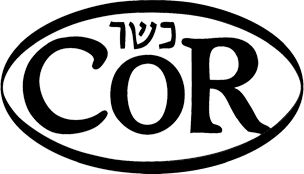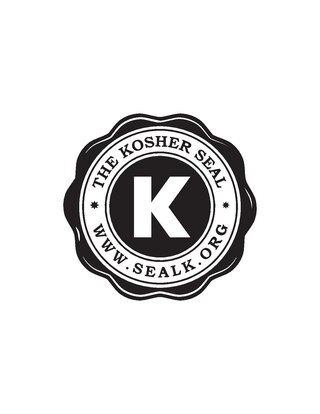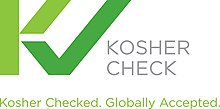Kashrut is a set of dietary laws dealing with the foods that Jewish people are permitted to eat and how those foods must be prepared according to Jewish law. Food that may be consumed is deemed kosher, from the Ashkenazic pronunciation (KUHsher) of the Hebrew kashér, meaning "fit".
A hechsher is a rabbinical product certification, qualifying items that conform to the requirements of Jewish religious law.

A mashgiach or mashgicha is a Jew who supervises the kashrut status of a kosher establishment. Mashgichim may supervise any type of food service establishment, including slaughterhouses, food manufacturers, hotels, caterers, nursing homes, restaurants, butchers, groceries, or cooperatives. Mashgichim usually work as on-site supervisors and inspectors, representing a kosher certification agency or a local rabbi, who actually makes the policy decisions for what is or is not acceptably kosher. Sometimes certifying rabbis act as their own mashgichim; such is the case in many small communities.
Kosher foods are foods that conform to the Jewish dietary regulations of kashrut. The laws of kashrut apply to food derived from living creatures and kosher foods are restricted to certain types of mammals, birds and fish meeting specific criteria; the flesh of any animals that do not meet these criteria is forbidden by the dietary laws. Furthermore, kosher mammals and birds must be slaughtered according to a process known as shechita and their blood may never be consumed and must be removed from the meat by a process of salting and soaking in water for the meat to be permissible for use. All plant-based products, including fruits, vegetables, grains, herbs and spices, are intrinsically kosher, although certain produce grown in the Land of Israel is subjected to other requirements, such as tithing, before it may be consumed.

The Orthodox Union is one of the largest Orthodox Jewish organizations in the United States. Founded in 1898, the OU supports a network of synagogues, youth programs, Jewish and Religious Zionist advocacy programs, programs for the disabled, localized religious study programs, and international units with locations in Israel and formerly in Ukraine. The OU maintains a kosher certification service, whose circled-U hechsher symbol, U+24CAⓊ, is found on the labels of many kosher commercial and consumer food products.

OK Kosher Certification is a major kosher certification agency based out of Brooklyn, NY. It is one of the "Big Five," the five largest kosher certifying agencies in the United States. OK also has a large kosher presence in Asia.

Triangle K is a kosher certification agency under the leadership of Rabbi Aryeh R. Ralbag. It was founded by his late father, Rabbi Yehosef Ralbag. The hechsher is a letter K enclosed in an equilateral triangle.
The Chicago Rabbinical Council is the largest regional Orthodox rabbinical organization in America, located in Chicago, Illinois. The cRc is a non-profit offering a wide variety of Jewish services, including kosher product supervision and kosher certification. Kosher certification is available around the world and throughout the year, including Passover supervision.

Kashruth Council of Canada, is a kosher certification agency in Canada. It is best known for its kosher supervision service, with the COR symbol found on the labels of many commercial and consumer food products. The council serves 1,000 facilities that provide 70,000 products to Canadian consumers. As of September 2014, COR employs 70 full-time and part-time mashgichim who work in local food service and catering venues, plus approximately 30 mashgichim worldwide who supervise COR-certified manufacturing plants. COR supervises food at event venues such as the Rogers Centre, the Air Canada Centre and the Toronto Zoo. In total, COR certifies 53 restaurants in Toronto. COR, in conjunction with Liaison Culinary College, has a college accredited training program for its mashgichim.
Magen Tzedek, originally known as Hekhsher Tzedek, is a complementary certification for kosher food produced in the United States in a way that meets Jewish Halakhic (legal) standards for workers, consumers, animals, and the environment, as understood by Conservative Judaism. Magen Tzedek certification is not a kashrut certification which certifies that food is kosher in that it meets certain requirements regarding ingredients of food and technical methods of animal slaughter, but an ethical certification complementary to conventional kosher certification.

The Central Rabbinical Congress is a rabbinical organization that is a consortium of various Haredi Jewish groups, with offices in Brooklyn, New York.
The Tav HaYosher is a certification mark offered, free of charge, to Kosher food establishments that meet a series of ethical criteria developed by the organization, Uri L'Tzedek. Particularly, the Tav HaYosher confirms that an eating establishment with its seal pays minimum wage to all employees and overtime to those employees working more than 40 hours a week. It also ensures the establishment offers employees appropriate breaks as required by law, and provides a safe and abuse-free working environment.
The "Kosher tax" is the idea that food companies and unwitting consumers are forced to pay money to support Judaism or Zionist causes and Israel through the costs of kosher certification. The claim is generally considered a conspiracy theory, antisemitic canard, or urban legend.
A kosher certification agency is an organization or certifying authority that grants a hechsher to ingredients, packaged foods, beverages, and certain materials, as well as food-service providers and facilities in which kosher food is prepared or served. This certification verifies that the ingredients, production process including all machinery, and/or food-service process complies with the standards of kashrut as stipulated in the Shulchan Arukh, the benchmark of religious Jewish law. The certification agency employs mashgichim to make periodic site visits and oversee the food-production or food-service process in order to verify ongoing compliance. Each agency has its own trademarked symbol that it allows manufacturers and food-service providers to display on their products or in-store certificates; use of this symbol can be revoked for non-compliance. Each agency typically has a "certifying rabbi" who determines the exact kashrut standards to be applied and oversees their implementation.

Seal-K Kosher is a kosher certification organization. The organization provides kosher supervision and certification for commercial kitchens, in addition to certifications for food production and shaatnez testing. The organization has its office in Chicago in 2021.

Kof-K, a Teaneck, NJ-based Kosher certification agency, is one of the "Big Five."

Orthodox Union Kosher, known as OU Kosher or OUK, is a kosher certification agency based in New York, New York. It was founded in 1923 by Abraham Goldstein. It is the certification agency of about 70% of kosher food worldwide, and is the largest of the “Big Five” major certification agencies, which include OK, Kof-K, Star-K, and CRC.
.kosher is a generic top-level domain owned by OK Kosher Certification. The filing of the application for the domain in January 2012 began a two-year process during which eleven other kosher certification agencies filed official objections, arguing that granting the application would give OK Kosher an unfair competitive advantage. In January 2014, ICANN ruled that OK Kosher could begin using the .kosher domain, after which the eleven objectors filed for reconsideration.
Kosher by ingredient is an approach to observing the laws of kashrut that determines whether a food is kosher or not based on ingredient, rather than by the presence of a hechsher. This approach has fallen out of favor with Orthodox Jews, but is practiced by many Conservative Jews as well as by some Reform Jews and Reconstructionist Jews.
Tablet-K is a kosher certification agency that was under the leadership of Rabbi Rafael Saffra until his death in 2009.









